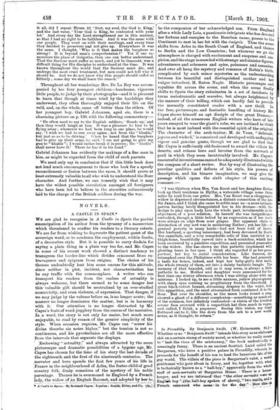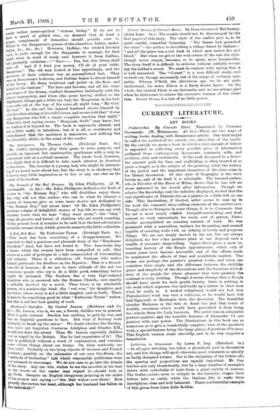In Piccadilly. By Benjamin Swift. (W. Heinemann. 6s.)— Whether or
no ." Benjamin Swift" intends this story as an elaborate skit on a certain stamp of society novel, or whether he really means to " Iasi; the vices of the aristocracy," the book undoubtedly is amazingly funny. There is an ancient Scottish Laird called the Bargarran, who hires a positive palace in Piccadilly, wherein he proceeds for the benefit of his son to lead the luxurious life of the gay world... The Villain of the piece is Bargarraa's valet, a weird gentleinan'Wh'd o'e:s hbont in livery, and he, together with what is technitallyltukiviit ha " hall;boy," apparently form. the whole staff of ineh-iterVants Bargarran Reuse. There is a house- keeper, and ive are • inforthed :that "the other lter voila mire, as English boy '-',(tb.e.ball-boy spoken of. above), " two..maidhip and a 'French niinlieoek Nirke eanie c in for- the day. Nbwilhiai0 surely rather mean-spirited " riotous living." If we are to have a novel of gilded vice, we demand that at least a proper complement of domestics should preside over it. Vbore is the Bargarran's groom-of-the-chambers, butler, under- &c., lie. ? However, Dalbiac, the wicked liveried valet, is quite enough for the Bargarran to manage, for that laird when in need of ready cash borrows it from Dalbiac, who promptly exclaims :—" Sacr— Yes, but this livery shall come off. And if I lend you money, I'll sit at your table, Bargeman !' The old man looked at him appealingly, and the isversion of their relations was an accomplished fact. They were in Bargarran's bedroom, and Dalbiac began to divest himself of his livery. He flung waistcoat and jacket on the floor, and kicked at the buttons." The hero and heroine, and all the other personages of the drama, conduct themselves habitually with the utmost impropriety, and when (the scene having shifted to the Highlands) things get a little too bad, the Bargarran in his bed- room calls out at the top of his voice all night long, " My God ! 31y God !" In the end the injured husband shoots himself by mistake when aiming at his wife's lover, and we are told that " it was only Bargarran who felt a single complete emotion that night."
What this dark saying means " Benjamin Swift" may know, but we confess it is beyond us. The book is supremely absurd, and not a little nasty in intention ; but it is all so overdrawn and overcoloured that the nastiness is innocuous, and nothing but the absurdity abides in the mind of the reader.











































 Previous page
Previous page